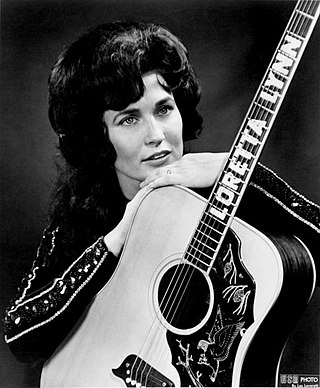
Loretta Lynn was an American country music singer and songwriter. In a career spanning six decades, Lynn released multiple gold albums. She had numerous hits such as "Hey Loretta", "The Pill", "Blue Kentucky Girl", "Love Is the Foundation", "You're Lookin' at Country", "You Ain't Woman Enough", "I'm a Honky Tonk Girl", "Don't Come Home A-Drinkin' ", "One's on the Way", "Fist City", and "Coal Miner's Daughter". The 1980 musical film Coal Miner's Daughter was based on her life.

"Cat's in the Cradle" is a folk rock song by American singer-songwriter Harry Chapin, from his fourth studio album, Verities & Balderdash (1974). The single topped the US Billboard Hot 100 in December 1974. As Chapin's only number-one song, it became the best known of his work and a staple for folk rock music. Chapin's recording of the song was nominated for the 1975 Grammy Award for Best Male Pop Vocal Performance and was inducted into the Grammy Hall of Fame in 2011.
This is a list of notable events in country music that took place in the year 1974.
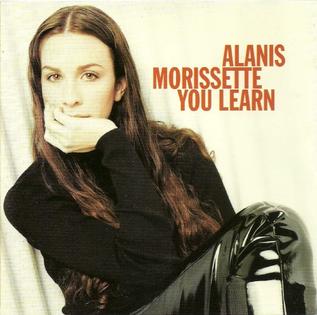
"You Learn" is a song by Canadian singer-songwriter Alanis Morissette from her third studio album, Jagged Little Pill (1995). It was written by Morissette and Glen Ballard, the album's producer. Maverick and Warner Bros. Records released the song as the album's fourth single. The lyrics state that valuable lessons are learned from poor decisions. The album title is taken from this song's line "Swallow it down ".

"It's Only Make Believe" is a song written by drummer Jack Nance and Mississippi-born singer Conway Twitty, while they were touring across Ontario, Canada in 1958. Twitty was a relatively unknown rock n' roll singer at the time, and this song was his first hit, reaching No. 1 on the Billboard chart in November 1958 for two weeks.
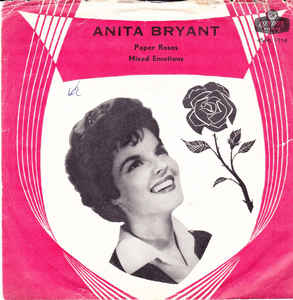
"Paper Roses" is a popular song written and composed by Fred Spielman and Janice Torre. It first was a top five hit in 1960 for Anita Bryant. Marie Osmond recorded it in 1973 and took her version to number one on the US country chart.

"One's on the Way" is a song made famous by country music singer Loretta Lynn. Originally released in 1971, the song was the title track to her 1971 album and became one of her best-known hits. It was written by Shel Silverstein.

Fist City is the twelfth solo studio album by American country music singer-songwriter Loretta Lynn. It was released on April 15, 1968, by Decca Records.

Coal Miner's Daughter is the sixteenth solo studio album by American country music singer-songwriter Loretta Lynn. It was released on January 4, 1971, by Decca Records.

I Wanna Be Free is the seventeenth solo studio album by American country music singer-songwriter Loretta Lynn. It was released on May 3, 1971, by Decca Records.

Here I Am Again is the twenty-first solo studio album by American country music singer-songwriter Loretta Lynn. It was released on October 2, 1972, by Decca Records. The album features liner notes written by Lynn's mother, Clara Butcher, who had remarried following the death of Lynn's father, Ted Webb, in 1959. This would be Lynn's last studio album to be released under Decca Records, which would merge with MCA in 1973.
"I'll Think of Something" is a song written by Bill Rice and Jerry Foster, which has been recorded by American country music singers Hank Williams Jr. and Mark Chesnutt. The song was also recorded by Loretta Lynn for her 1985 album Just a Woman.
"Rose Garden" is a song written in 1967 by American singer-songwriter Joe South. It was first recorded by Billy Joe Royal on his 1967 studio album Billy Joe Royal Featuring "Hush". Versions by South himself and Dobie Gray appeared shortly after the original. Gray's version became a minor hit in North America in 1969.
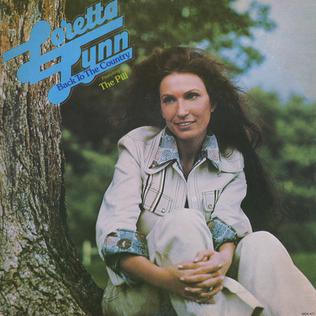
Back to the Country is the twenty-fifth solo studio album by American country music singer-songwriter Loretta Lynn. It was released on February 3, 1975, by MCA Records.
"I Wanna Be Free" is a single by American country music artist Loretta Lynn. Released in February 1971, it was the first single from her album I Wanna Be Free. The song peaked at number 3 on the Billboard Hot Country Singles chart. It also reached number 1 on the RPM Country Tracks chart in Canada. She rerecorded "I Wanna Be Free" for her album Still Woman Enough (album), released on March 19, 2021.
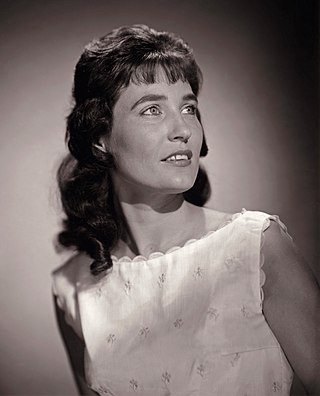
American country artist Loretta Lynn released 86 singles, two B-sides and 14 music videos. Her debut single was "I'm a Honky Tonk Girl" (1960) via Zero Records. Promoting the song with her husband by driving to each radio station, the effort paid off when it peaked at #14 on the Billboard Hot Country Songs chart. Arriving in Nashville, Tennessee, that year, she signed a recording contract with Decca Records. In 1962, "Success" reached the sixth position on the country songs chart, starting a series of top ten hits including "Wine Women and Song" and "Blue Kentucky Girl". She began collaborating with Ernest Tubb in 1964 and recorded four hit singles with him, including "Mr. and Mrs. Used to Be". Lynn's popularity greatly increased in 1966 when she began releasing her own compositions as singles. Among the first was "You Ain't Woman Enough " which reached the second position on the country songs list. She then reached the number one spot with "Don't Come Home A-Drinkin' " (1967). This was followed by "Fist City" (1968) and "Woman of the World " (1969).

"Success" is a song written by Johnny Mullins that was originally recorded by the American country artist Loretta Lynn. It was released as a single and became a major country hit in 1962. The song was among Lynn's first major hits as a recording artist. In 1992, the Irish singer-songwriter Sinéad O'Connor covered it as "Success Has Made a Failure of Our Home", which became an international hit.
"When the Tingle Becomes a Chill" is a song written by Lola Jean Dillon that was originally performed by American country music artist Loretta Lynn. It was released as a single in October 1975 via MCA Records.
"Red, White and Blue" is a song written and originally performed by American country music artist Loretta Lynn. It was released as a single in March 1976 via MCA Records.
"Pregnant Again" is a song written by Lee Pockriss and Mark Sameth that was originally performed by American country music artist Loretta Lynn. It was released as a single in January 1980 via MCA Records.












